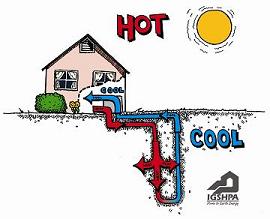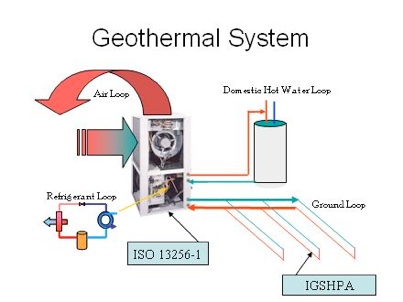Serving all of WNC including Asheville, Hendersonville, Black Mountain, Canton, Brevard, Maggie Valley, Waynesville, Burnsville, Marion, Old Fort, Mars Hill, and Marshall.
Copyright 2009-2019 Asheville Geothermal Inc., All Rights Reserved

WNC’S GEOTHERMAL EXPERTS

The Geothermal Heat Pump
A Geothermal System uses the thermal stability of the earth to provide both heating and cooling. It can also provide your hot water. The equipment used for Geothermal is very efficient and will cost far less to operate than the typical heating or cooling system. It is also the most cost effective type of Alternative Energy for residential use, and that is why it is now receiving strong support from the government in the form of Tax Credits.
Basics - The Heat Pump
The basic principal in Geothermal heating and cooling is that heat is being moved from one place to another. The tool involved in this is a Heat Pump, or in the case of Geothermal, a Ground Source Heat Pump. This device works the same as a refrigerator or air conditioner -- it simply moves from either away from where there is too much or to where there is too little.

Geothermal Heating
In the heating mode, the water circulating in the earth loop is colder than the surrounding ground. This causes the water to absorb energy, in the form of heat, from the earth. The water carries this energy to the heat exchanger in the pump. In the heat exchanger, refrigerant absorbs the heat energy from the water. The water now leaves the heat exchanger at a colder temperature, and circulates through the earth loop to pick up more energy.
The refrigerant gas, which contains energy gained from the earth loop, travels from the heat exchanger to the compressor. In the compressor, the refrigerant temperature rises to 160ºF. From the compressor, the superheated refrigerant travels to the air heat exchanger. Here, the heat pump's blower circulates air across the air coil, increasing the temperature of the air, which is blown through ductwork to heat the home. After refrigerant releases its heat energy to the air, it then flows to the earth loop heat exchanger to start the cycle again.
Geothermal Cooling
In the cooling mode, the water circulating in the earth loop is warmer than the surrounding ground. This causes the water to release energy, in the form of heat, into the earth. The loop water, now cooler from traveling through the ground now flows to the heat exchanger in the heat pump. In the heat exchanger, hot refrigerant gas from the compressor releases its heat into the water. This causes the water to increase temperature, which it releases to the ground.
The refrigerant, which has released its heat energy and become a cold liquid, now travels to the heat exchanger. Here the heat pump's blower circulates warm, humid air across the cold air coil. The air is then blown through ductwork to cool the home. The refrigerant in the air coil picks up the heat energy from the air, and travels to the compressor. When the refrigerant leaves the compressor, it then flows to the earth loop heat exchanger to start the cycle again.
Domestic Hot Water
Another benefit of Geothermal Systems is that you get some or all of your hot water heated as a byproduct. In the summer time, your hot water will be FREE! This is because the excess heat from the compressor itself is captured and used to heat your water. In the winter time, the geothermal system is used to heat your water, and since the geothermal system operates so efficiently, this will reduce your current cost of hot water significantly.
Other Benefits of Geothermal Systems
There are additional significant benefits of Geothermal Systems worth consideration. Please see the page on Other Geothermal Benefits for more information.




Serving all of WNC including Asheville, Hendersonville, Black Mountain, Canton, Brevard, Maggie Valley, Waynesville, Burnsville, Marion, Old Fort, Mars Hill, and Marshall.
Copyright 2009-2019 Asheville Geothermal Inc., All Rights Reserved